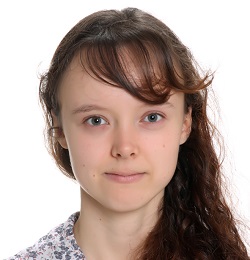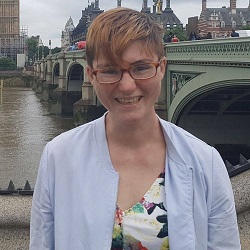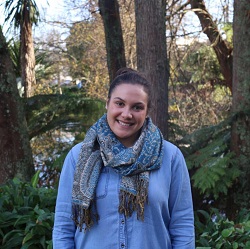2017 ACBS Diversity Committee Scholars
2017 ACBS Diversity Committee Scholars CommunityFrance Dissemination Activities 2017
France Dissemination Activities 2017Lea Stephany, France
Could you please tell us a little about you and your background?:
My name is Lea Stephany, I am a first-year Master student in Psychology at the University Toulouse 2 Jean Jaurès. Since the beginning of high school, I have been interested in behavioural science and wished to pursue my studies in a subject related to that field. Later on as I chose psychology, the lack of information and lessons about other behavioural sciences in the undergraduate years pushed me to read a lot on my own, and to start an independent learning on subjects such as linguistics, cognitive and behavioural therapies for instance. As I went through my Erasmus exchange in Turkey, I had become a fervent defender of CBT. But throughout this exchange, I met many people from diverse backgrounds, and I went through a period of questioning and rethinking. I became aware of certain flaws in the traditional CB approach, and became interested in mindfulness, metaphors, and acceptance. I started once again an independent learning on these subjects, and as I came back to France to carry on with my first year of Master, I had the opportunity to work on the study of a Mindfulness Acceptance and Commitment Based Group Therapy. Throughout my curriculum I had the opportunity to study in 3 different universities. I spent my first undergraduate year at the university of Strasbourg (France) and then moved to Toulouse (France) where I was selected in third year to go on an exchange program to Izmir (Turkey). Being able to study in different universities was of great benefit for my personal experience, as the professors often approached common psychology subjects from a different perspective. Some of the courses that I attended at Yasar University in Izmir even came in profound contradiction with my own assumptions. Facing divergence in basic opinions pushes me to question myself, and these divergences are often the motor of my reflexion.
How did you become interested in CBS?:
I think I always was interested in CBS! Since my early teenage years, I was interested in language and its effect on people as well as brain processes, behaviours and so on. Many questions that I asked myself about the impact of bilingualism, voice hearing processes, the use of metaphors through literature, music in our heads etc…, motivated me to make researches on my own, and the more I learned, the more I wanted to know! Many of these questions, that stayed with me along the years, were partly answered by the study of the Relational Frame Theory. I now believe that RFT is a major psychological theory that allows us to explain numerous human behaviours, and that its contribution to a better understanding of human functioning is only starting.
Could you tell us about your research and application interests?:
Throughout the past year, I worked on a research project which aimed to compare two groups of patients struggling with anxiety syndromes. We compared the evolution of the symptoms as well as the changes in the psychological flexibility at post-therapy and at long term. The results were very interesting, as we discovered that patients who took part in the therapy up to 4 years before, and who continued practicing the exercises and the techniques taught in the therapy, saw their psychological flexibility increase even after the therapy. Even though the group was small, it was great to come up with positive results allowing us to take into account the importance of follow up sessions and of the weekly practise of the exercises. As for my application interest, I wish to be accepted in the University of Grenoble, which hosts a Master’s degree specialised in third waves psychotherapies. And after the acquisition of my M.A., I aim to carry out abroad internship’s to perfect my practical experiences.
Could you tell us about your experience at the World Conference this year?:
Going to Seville in June was a completely unique experience. After working on ACT and RFT for only a year, being suddenly propelled in this bright environment was more than I could ever hope. I was able to assist to workshops wonderfully presented, to meet open minded, diverse and kind people, to express myself freely, question, and be answered, and most of all, I felt fully welcomed in the ACBS community, even though I had begun only shortly.
Was there anything that stood out to you about the CBS community?:
Yes. The main thing that stood up for me was the total rupture with the conventional hierarchical system. As a student, only recently discovering the professional world, it seems to me that French society has profound roots in the respect and courtesy due to higher ups, and depending on your social and economic status, a set of implicit rules are meant to be followed. If my first experience with the ACBS community was so unforgettable, it may be thanks to the open and horizontal relations that took place in the World Conference. Being able to step up to anyone, say hello and introduce myself, no matter one’s reputation, amazed me and enabled me to gain confidence in myself.
What will you be taking back from your experience that might be helpful to you?:
Besides the great deal of unvaluable knowledge acquired by attending the conferences and workshops, I came back to Toulouse with the deep motivation of pursuing my studies on ACT and RFT. The encounter with professionals coming from all over the world, who shared with me their practises and experiences, reinforced my will to learn more, practise and exchange on ACT. I also came back with a huge list of books and articles to read, websites to explore, and podcasts to listen! I am now as motivated as ever to continue on this path, and proof at hand: I will be going to an ACT workshop in Lyon in mid-October !
Do you have anything else that you would like to share with the community?:
I am more than thankful to have been given this opportunity, and hope that many other students will benefit from the diversity scholarship. I can only thank the whole ACBS community for providing me with these unforgettable memories, and hope the amazing community spirit stays on trend!
Are you wondering how you can help to disseminate CBS in the developing world through scholarship opportunities like this? Please consider donating to the Diversity, Equity and Inclusion Fund via Paypal by using the button below. Your donation will help us continue to bring increased diversity to our annual conferences by providing funds for individuals who come from diverse backgrounds and who would not be able to attend an ACBS conference without this added financial support.
Every dollar/euro/yen goes to helping those in need -- not a nickel goes to administration. Money collected for this fund is distributed by an ACBS Diversity, Equity and Inclusion committee. Scholarships are awarded based on need and merit.
Please note that this contribution does not qualify as a tax-deductible charitable contribution, according to USA tax law ... but it's a nice thing to do.
New Zealand Dissemination Activities 2017
New Zealand Dissemination Activities 2017Claire Turner, New Zealand
Could you please tell us a little about you and your background?:
I grew up in Auckland, New Zealand. Aspects of my childhood were very difficult, and led to psychological difficulties. These impacted my relationships, my studies, and my quality of life. I am slowly making my way through an undergraduate degree in psychology at the University of Auckland, while focusing on my recovery. I aim to become a clinical psychologist in the future.
How did you become interested in CBS?:
I was first introduced to contextual behavioural science through participating in individual and group Acceptance Commitment Therapy. I found adopting a curious, open and compassionate stance to my difficult experiences to be transformative. I was drawn to ACT’s non-pathologizing and pragmatic approach, and its emphasis on values based living.
Could you tell us about your research and application interests?:
Currently I am interested in RFT as a clinical intervention. I am also interested in applying a phenomenological approach to mental distress, and in the peer movement and peer co-development of research projects.
Could you tell us about your experience at the World Conference this year?:
This was my first world conference. It was interesting, engaging and valuable. I met with and talked to others pursuing values-based lives, and felt reassured and encouraged. One highlight was presenting about my lived experience in an ACT for groups and ACT for acute experiences symposium. Another was witnessing challenging and honest roleplays. There was a great mix of intellectual and emotive material, and didactic and partner work. In bringing memories of the World Con to mind, I feel very grateful for my experiences, and encouraged in both my personal and professional journey.
Was there anything that stood out to you about the CBS community?:
On a social outing, I witnessed a community member cry at the beauty of the Seville Cathedral. His bravery in sitting with and expressing his emotion was very inspiring, and encapsulates, I believe, the essence of the ACBS community. I talked to people who were not just talking the talk, but were walking the walk. Their humanness and pursuit of values directed living, particularly honesty and authenticity, bring a lightness to my heart.
When I think of the CBS community, I am reminded of the quote, “who are you when nobody is watching?” To act in a values consist way honours not only others, but myself, and as I learn the importance of this, I keep in mind the thousands of others throughout the world sharing not only my interests but the values underlying the pursuit of these interests.
What will you be taking back from your experience that might be helpful to you?:
In attending the World Conference, I clarified what I most valued and found important to me. I was able to put my current difficulties around completing my university degree into a wider perspective, and investigate how, in small ways, I can live out my values in my daily life.
Since the conference I have been learning to slow down, to use patience, and to trust in my journey and that I will return to university to finish my degree when I am well enough.
The opportunity to view presentations and also to present to others has encouraged me to spread the word about ACT in my local community. Since arriving home I have presented a workshop on ACT to a group of peer support workers. I have represented the health consumer perspective on a digital health strategy in New Zealand, and on the issues of housing and employment for mental health service users. I have submitted an application to consult on issues for consumers within inpatient wards.
Do you have anything else that you would like to share with the community?:
Thank you, most sincerely, for the opportunity to learn at the World Conference. Thank you to those who donated to the diversity scholarship fund, and thank you to those that I talked with. Seville 2017 was and is very important to me.
Are you wondering how you can help to disseminate CBS in the developing world through scholarship opportunities like this? Please consider donating to the Diversity, Equity and Inclusion Fund via Paypal by using the button below. Your donation will help us continue to bring increased diversity to our annual conferences by providing funds for individuals who come from diverse backgrounds and who would not be able to attend an ACBS conference without this added financial support.
Every dollar/euro/yen goes to helping those in need -- not a nickel goes to administration. Money collected for this fund is distributed by an ACBS Diversity, Equity and Inclusion committee. Scholarships are awarded based on need and merit.
Please note that this contribution does not qualify as a tax-deductible charitable contribution, according to USA tax law ... but it's a nice thing to do.
New Zealand Dissemination Activities
New Zealand Dissemination ActivitiesSara Runga, New Zealand
Could you please tell us a little about you and your background?:
Kia ora! My name is Sara, I am of indigenous Māori decent, and I come from New Zealand! I am currently undertaking my thesis for the degree of Master of Applied Psychology in Behaviour Analysis (MAppPsy-BA) at The University of Waikato. My decision to journey into postgraduate studies stemmed from my personal experience battling a mental health illness. I understand that times such as these can be extremely tough for individuals and their loved ones, and I want to be able to provide these people with the tools they need to lead healthy and rewarding lives.
How did you become interested in CBS?:
I was introduced to CBS during the first year of my masters program in 2016. ACT seemed like a natural extension to the behaviour analytic work I had started becoming passionate about! I was excited to come across an approach that felt like something I could, and have been, applying to my own life! One of the many things I love about ACT, is that it incorporates a holistic approach to achieving health and wellbeing, thus aligning with indigenous Māori frameworks of health.
Could you tell us about your research and application interests?:
I am interested in the application of ACT to health-related issues such as obesity, particularly for indigenous populations. In New Zealand, we have extremely high rates of obesity amongst our indigenous Māori and Pasifika communities, and I am interested in adapting ACT principles to weight loss methods.
Could you tell us about your experience at the World Conference this year?:
My experience at the World Conference this year was beyond amazing! The environment facilitated my learning in ways that I hadn’t expected! I particularly enjoyed the practical workshops that incorporated role play exercises as they provided ideas for integrating the ACT matrix into practice.
Was there anything that stood out to you about the CBS community?:
One thing that I find really inspiring about the CBS community is that we share the same values. It’s as though we all have a common purpose, and it goes beyond our work into our everyday lives. Everyone I met was genuinely supportive and caring of one another, and I just love that!
What will you be taking back from your experience that might be helpful to you?:
Attending this conference has been such a rewarding experience and it is really difficult to pinpoint one exact moment that has been helpful because the truth is, the whole experience was totally invaluable! Receiving this scholarship gave me the opportunity to connect with fellow students, researchers, and practitioners from across the world, whom of which I would never had met had I not been in attendance! Listening to the presentations of the many world renowned researchers at the conference was awe-inspiring, and allowed me to attain skills and knowledge that I can take forward into my research pursuits, employment, community volunteering, and my own life!
Do you have anything else that you would like to share with the community?:
Thank you to the diversity committee for choosing me as a recipient of this scholarship! I am incredibly grateful for the experiences I had, and the people I met as a result of attending the conference! Also, a big thank you to those who contributed to the diversity fund, without your support, I would not have made it here and attending the world conference has truly made a difference to my work, my education, and my life!
Are you wondering how you can help to disseminate CBS in the developing world through scholarship opportunities like this? Please consider donating to the Diversity, Equity and Inclusion Fund via Paypal by using the button below. Your donation will help us continue to bring increased diversity to our annual conferences by providing funds for individuals who come from diverse backgrounds and who would not be able to attend an ACBS conference without this added financial support.
Every dollar/euro/yen goes to helping those in need -- not a nickel goes to administration. Money collected for this fund is distributed by an ACBS Diversity, Equity and Inclusion committee. Scholarships are awarded based on need and merit.
Please note that this contribution does not qualify as a tax-deductible charitable contribution, according to USA tax law ... but it's a nice thing to do.